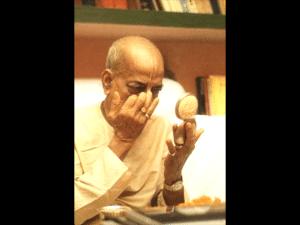Transcendental trick
Brahmatirtha : When I was in engineering school in the 1970s, I studied Bhagavad-gita in an Oriental Philosophy class. In the entire Gita there was only one verse that stuck in my mind, that "Even if Krishna's devotees commit abominable acts, they are to be considered saintly because they are rightly situated." It's not one of the more significant verses of the Gita, but I was a black-and-white type person, that you're either a saint or a sinner, and I couldn't understand that verse.
I asked my professor to explain it to me, and he said, "It's intuitively obvious." That was his way of saying he didn't know, so I said, "Okay." I had read the Gita in English, and in my life I had never read or seen Sanskrit. When I met Prabhupada, I asked him, "If somebody lives an evil life and prays to become rich, may he still become rich?" Prabhupada said, "Yes, praying to Krishna is not evil. Somehow or other, he prays to Krishna, so you cannot say he is evil." "Yes," I said. Srila Prabhupada said, "Krishna says in Bhagavad-gita "api cet su-duracaro bhajante mam ananya bhak." Have you read it?" I said, "Yes. The Sanskrit I don't know, but the English I do."
That was the only verse in the whole Bhagavad-gita that I knew in English, and that was the very first verse that Prabhupada quoted to me in Sanskrit and asked me if I knew what it meant. Later it dawned on me that Prabhupada transcendentally tricked me. Prabhupada knew that was the only verse I knew in Gita, and that's the first one he quoted me.
Reference: Memories Anecdotes of a Modern Day Saint - Volume 2 by Siddhanta Dasa
Recently Added
Trending Today
